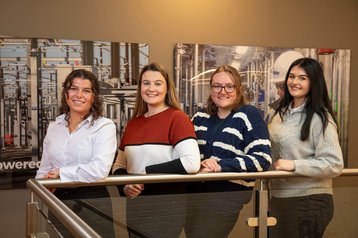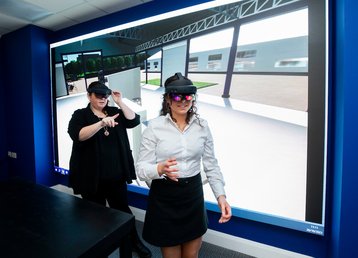Put any group of data center executives into a room and, before long, you’ll start hearing the dreaded term “skills shortage.”
It’s become an increasingly acute problem across the industry during the post-pandemic years. Yet, the demographics of the average facility still show a strong bias towards men. Surely, by drawing on a wider pool of potential employees, be that by increasing opportunities for women in STEM, or opening the floor to applicants without previous engineering experience, we can address the skills gap?
Amy Lane is group electrical engineering manager at Kirby Group, an Irish-based multinational mechanical and electrical engineering contractor. Alongside her main role, Lane has been actively involved in efforts to bring more women into her field, which has led to her spearheading several programs around wider workforce diversity. DCD caught up with her to look at what her experiences can teach us about how to solve the skills shortage. To begin with, Lane tells us about how she got into STEM in the first place.
“I went to an all-girls school and engineering was never an option. It was my Dad that pushed us down this road. I'm one of four. We have an electrical engineer, a mechanical engineer, a biomedical engineer… and then we have one ‘black sheep,’ who went down the path of HR.”
Hooray for Dad. Did he have any tricks up his sleeve to persuade you?
“My Dad encouraged me to focus on my strengths around maths and related subjects and to be honest, I saw that engineering can pay quite well, so I decided to give it a go. My Dad works on a bribery method of parenting. He goes, ‘Pick any course. I don't care what you pick, but, if you go to college, I'll buy you an Audi TT.’ It was a bribe.”
Lane pauses and laughs.
“I never got the Audi, though.”
Skills shortage
Despite her lack of German engineering marques, Lane has gone on to work with Kirby to diversify the workforce, which is paying dividends in the wake of the current skills shortage.
“For the last couple of years in Ireland, there has been a skills shortage. We're all trying to get the same pool of engineers, and then we have emigration, so you're losing that skill from Ireland to the UK, and further afield.”
As a result, Kirby has widened the search, both in terms of demographics and skillsets. As well as enhancing opportunities for women, who remain underrepresented in the industry, Kirby has begun encouraging applications from people without formal qualifications in engineering and seeking talent from overseas.
The company has sought out people from countries such as Turkey, South Africa, Romania, and Sweden, with a huge focus on making its graduate training program worthwhile. “I take on up to 20 graduates every year from a mixed pool of electrical and mechanical - you're going to have at least two to three that will progress to lead engineers,” she says. “We're bringing the talent up from the bottom.”
Apprenticeships
Transferable skills play a big part in widening the talent pool, and Kirby has adopted a policy of retraining and upskilling staff – not only from within but in its external recruitment policy too. Lane gives an example: “We have an apprentice engineer program for electricians who want to segue over to engineering.
“It's a part-time course, and we work with the Technological University of the Shannon (TUS). They do a two-year program placement with us, for a level seven degree. They're provided with a mentor inside Kirby to work with them through the program.”
Of course, that means making sure that, from a young age, students know that there are options for them no matter what their route through education is. We ask if that means that Kirby spends a lot of time touring secondary schools.
Lane tells us: “We do - but even at 16-17, it may be too late because they’ve picked their subjects. Ideally, you want to make an impression at a primary school level - with science weeks, and engineering weeks.”
That means setting up primary school visits which makes a huge difference, even if it doesn’t mean Kirby benefits from it immediately.
It also means setting tasks fit for the age demographic. “We do experiments, or maybe I’ll get them to build a bridge out of lollipop sticks and rubber bands. It’s important to let them know what's possible,” she says.
“For example, my daughter has been diagnosed with dyslexia, and she's excellent at math. Letting kids know there's a professional option for people with a neurodivergence is good to show.”
That’s all very well, we point out, but young kids can be a tough crowd!
“Getting in the door of a school is the first hurdle. Reaching out to their local schools and saying, ‘Would you like us to come for Engineering Week or STEM week?’ Nine times out of ten, the schools take us up on the offer,” Lane says. “We've made it as engaging as possible - so much so that we get asked to come back every year. It’s about piquing their interest in the subject.”
Women in tech
But for Lane, the real opportunities to widen the talent pool come from bringing aboard a wider demographic, and that means women. Kirby has demonstrated a real commitment to this.
“We are running a very successful bursary program for female student engineers, and we have been fortunate to benefit from this program through the recruitment of quite a few female graduates since its establishment,” she says proudly.
That’s a huge commitment in time, resources, and money, but Kirby has shown that it works, to the extent that there are plans to widen the scheme to 15-16-year-olds.
“The bursary includes financial support, mentorship, and internship during their placement in their third year of college.”
Despite all this, Lane is keen not to be seen as simply a “female engineer,” and working at Kirby has enabled her to pursue the diversity of women in STEM, but without the “token girl” tag.
“It has been a real problem in the industry. My counterparts and I are more than just a female version of an engineer,” she says. “I have a passion for getting females into engineering.”
When she came to Kirby, she told them that she wanted to make a positive difference, giving time to schools to help increase the number of female engineers. “The senior management here has always been on board with it. Kirby is proactive in engaging and investing in these activities and events,” she says.
People first
Kirby puts training at the front and center of its efforts to attract and retain talent, as Lane explains: “‘People first’ is at the very top of all our values. It's people, people, people – and the proof is in the pudding.”
In her two years at the company, “there's been no shortage of investment in our people,” she says. “They are progressive and appreciate the importance of upskilling our people. We rolled out just shy of 900 hours of technical training to the electrical engineering department last year, and we continue to improve on that figure every year.”
But training isn’t a panacea. Company culture is a vital element in attracting the best of the best: “People need to wake up and want to come to work. There's a lot more to that than the fluffy side of it. Yes, we get the nights out, and the go-karting, but the next thing is we have a progression within Kirby. It's really important to make sure that people see where their careers are going.”
Every year, the company sits down individually with each staff member and goes through it. “People know that no matter where they want to go, we'll assist them in that, even if it's moving to another department within the company so that we can retain their skills, rather than lose them to another company.”
Global culture
Earlier, we talked about widening the pool by recruiting from a broader range of territories. We ask Lane whether that has presented any problems with cultural norms or negatively affected the company culture. She emphatically says no.
“We have people from every corner of the Earth now working internally. Building that team has been successful, but that's all down to the basic culture and values of the company.”
Lane notes that the company goes to great lengths to support people moving to a new territory to work with them: “We need them to be happy and settled to help them get the most from the experience and make their best contribution to the company.”
For Kirby, the commitment to doing right by potential staff starts from the interview stage, with a clear, transparent explanation of the job, something even more important for applicants from outside Ireland.
Lane says it’s critical to understand a person’s expectations, and then clearly explain the role, and the realities of living and working in Ireland. “If someone signs on the dotted line and they come over, they know exactly what they're getting at that point,” she says.
“Transparency is critical during that hiring stage. If someone thinks they're being given something that they didn't expect, you're going to lose them.”
Finally, we talk about the elephant in the room: Artificial intelligence. Opinions differ on exactly what changes AI will bring to the labor market, with some seeing it as a portent of looming days of unstaffed “dark” facilities, there’s no doubt in Lane’s mind that human resources will always be a vital part of the data center industry:
“AI is here to stay. It is part of our present and our future. At Kirby, our dynamism and progressive ethos ensures that we are working proactively to identify opportunities to deploy AI to help make our people more efficient, productive, and cost-effective.”
So, before we go, does Lane have any final tricks and tips on how to engage young people with engineering?
“When I go into schools, I have a presentation that shows all the different parts of the world that I've managed to visit, through my job, and they always ask ‘What? You got there?’ And I say, ‘I got there – all for free while working hard, as part of a really rewarding career – and you could too.’ That helps.”
We’re sure it does.
For more information about Kirby's commitment to equality, diversity and inclusion, click here


